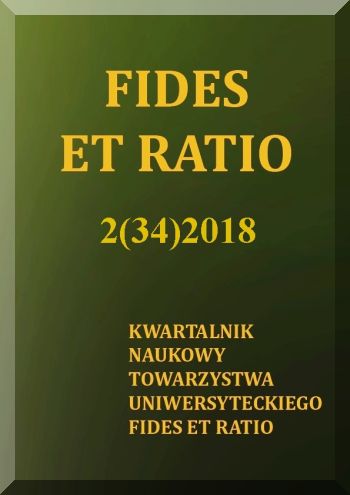Abstract
Determinants of the level of the hope for success are seen in relations with parents. Research has been carried out to find the answer to the question about the relationship between the perception of parental attitudes of mothers and fathers and the hope for success of adolescents. 150 high school students aged from 17 to 19 participated in the study. The Scale of Hope for the Success of Łaguna, Trzebiński and Zięba, The Scale of Parental Attitudes SPR-2 of Plopa in the version My Mother and My Father were used. A positive relationship was found between the accepting attitude and the overly protecting attitude for both parents and the hope for the success of the youth. In addition, it has been proven that consistent attitudes of both parents, characterized by high acceptance and autonomy, demand, consistency and moderate child protection, are beneficial for the high level of adolescents' hope. In conclusion, the hope for the success of the adolescents is connected with the parental attitudes perceived by the adolescents.
References
Feldman D. B., Ran K. L., Kahle-Wrobleski K. (2009), Hope and goal attainment: testing a basic prediction of hope theory, Journal of Social and Clinical Psychology, 28 (4), 479-497.
Feldman D. B., Kubota M. (2015), Hope, self-efficacy, optimism, and academic achievement: Distinguishing constructs and levels of specificity in predicting college grade-point average, Learning & Individual Differences, 37, 210-216.
Feldman D. B., Snyder C. R. (2005), Hope and the meaningful life: Theoretical and empirical associations between goal–directed thinking and life meaning, Journal of Social and Clinical Psychology, 24 (3), 401-421.
Hartman J., Patock-Peckham J., Corbin W. i in. (2015), Direct and indirect links between parenting styles, self-concealment (secrets), impaired control over drinking and alcohol-related outcomes, Addictive Behaviors, 40, 102-108.
Heaven P., Ciarrochi J. (2008), Parental styles, gender and the development of hope and self- esteem, European Journal of Personality, 22, 707-724.
Hibbard D., Walton G. (2014), The development of perfectionism: The influence of parenting style and gender, Social Behavior And Personality, 42 (2), 269-278.
Kozielecki J. (2006), Psychologia nadziei, Warszawa: Wydawnictwo Akademickie „Żak”.
Krok D. (2008), Nadzieja czy beznadziejność? Psychologiczne funkcje nadziei w regulacji zdrowia fizycznego i przystosowania psychicznego, (w:) Oblicza Nadziei, M. Worbs (red.), 37-52, Opole: Redakcja Wydawnictw WT UO.
Krok D. (2013). Nadzieja jako predyktor wymiarów dobrostanu psychicznego. Polskie Forum Psychologiczne, 18 (2), 157-172.
Kuperberg A. L. (1996), The relatinship between percived social suport family behavior, self-esteem and hope on adolescent's strategies for coping with career, Humanities and Social Sciences, 56(9-A), abstrakt.
Łaguna M., Trzebiński J., Zięba M. (2005), Kwestionariusz Nadziei na Sukces, Warszawa: Pracowania Testów Psychologicznych Polskiego Towarzystwa Psychologicznego.
Matuszewska M. (1989), Percepcja postaw rodzicielskich i jej oddziaływanie na rozwój osobowości dzieci, Psychologia Wychowawcza, 32(4), 354-360.
Nurmi J., Pulliainen H. (1991), The changing parent-child relationship, self-esteem, and intelligence as determinants of orientation to the future during early adolescence, Journal of Adolescence, 14(1), 35-51.
Okhakhume A. (2014), Influence of Self-Esteem, Parenting Style and Parental Monitoring on Sexual Risk Behaviour of Adolescents in Ibadan, Psychological Gender & Behaviour, 12 (2), 6341-6353.
Plopa M., (2005), Psychologia rodziny: teoria i badania, Kraków: Oficyna Wydawnicza: Impuls.
Plopa M., (2012), Rodzice a młodzież, teoria i metoda badania, Warszawa: Vizja Press & It.
Plopa M. (1987), Skala postaw rodzicielskich, Psychologia Wychowawcza, 30(5), 552-565.
Ryś M. (2011), Oddziaływania wychowawcze rodziców a nadzieja na sukces i kompetencje społeczne u ich dzieci, Kwartalnik Naukowy Fides et Ratio, 3(7), 86-108.
Sabaj M. (2015), Znaczenie stylów i postaw wychowawczych rodziców w rozwoju dziecka, (w:) Rodzina fundamenty i pedagogia, J. Zimny (red.) 189-199, Stalowa Wola: Katolicki Uniwersytet Lubelski Jana Pawła II.
Snyder C. R., Shorey H. S., Cheavens J., Pulvers K. M., Adams III V. H., Wiklund C. (2002), Hope and Academic Success in College, Journal of Educational Psychology, 94(4), 820-827.
Snyder C.R., Sympson S.C., Ybasco F.C., Borders T. F., Babyak M.A., Higgins R.L. (1996), Development and Validation of the State Hope Scale, Journal of Personality &Social Psychology, 70 (2), 321-335.
Trzebiński J. (2008), Dwie nadzieje, (w:) Współczesny człowiek w świetle dylematów i wyzwań: perspektywa psychologiczna, M. Plopa, M. Błażek (red.), 19-27, Kraków: Impuls.
Ziemska M. (1967), Z badań nad kształtowaniem się postaw rodzicielskich, Psychologia Wychowawcza, 10(1), 81-85.
Ziemska M. (1973), Postawy rodzicielskie, Wydanie 2, Warszawa: Wiedza Powszechna.
